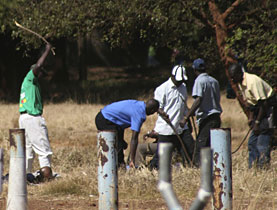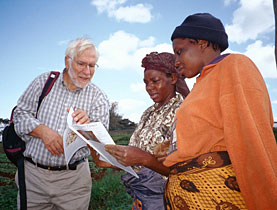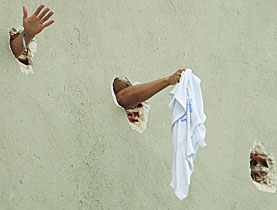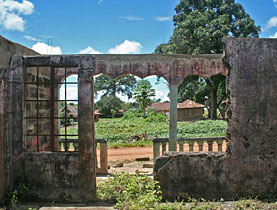Envoy to Zimbabwe urges regional pressure

As security in Zimbabwe worsens, the Swiss ambassador to Harare has said that pressure on the former British colony must come from regional organisations.
The government of Robert Mugabe said that run-off elections would go ahead on Friday despite the withdrawal of opposition leader Morgan Tsvangirai.
Tsvangirai’s Movement for Democratic Change was the leader after March’s presidential elections.
The United Nations Security Council on Monday condemned the campaign of political violence in Zimbabwe and unanimously declared that a free and fair election would be impossible.
The leaders of Tanzania, Angola and Swaziland were on Wednesday set to meet in Swaziland to discuss the crisis. A spokesman for South African President Thabo Mbeki – the regional mediator for Zimbabwe whose campaign of so-called “quiet diplomacy” has been criticised by regional leaders – said he would not attend.
“Pressure should be applied to convince the government of Zimbabwe to have free and fair elections,” Swiss ambassador Marcel Stutz told swissinfo.
However, he said that positions taken outside Africa were less effective. “If the European Union or Switzerland makes a declaration, this is important but it will not be of top priority to the Zimbabwean government. The pressure should come primarily from Sadc [Southern African Development Community], and the African Union,” he said.
Stutz said the country was still functioning but that the security situation had deteriorated in the past few days. “People are afraid, they don’t know what will happen.”
Tsvangirai, who on Sunday sought refuge in the Dutch embassy, said that the state-sponsored violence against his supporters made elections impossible. The MDC’s secretary general, Tendai Biti, is being held by police on treason charges.
“Extreme violence”
Following a Sadc meeting to discuss the crisis on Monday, the regional organisation’s executive secretary Tomaz Salomao told reporters the group agreed with Tsvangirai that a “climate of extreme violence” existed in Zimbabwe.
A Zimbabwean activist who travelled to Switzerland to report to the UN Human Rights Council in Geneva on the situation has confirmed reports of violence targeting opposition supporters.
“The political atmosphere is very tense, violence has erupted all over the country,” Prosper Munatsi, secretary-general of the Student Christian Movement of Zimbabwe (SCMZ), told swissinfo. “There are severe beatings of people in rural and urban areas. Everywhere people are being beaten by the state sponsored youth militias.”
Munatsi says his departure was delayed by a week because Zimbabwean security forces raided his office on June 12 and arrested him along with nine others. He was released after two days.
On Tuesday, the young activist addressed a meeting at the Centre for African Studies at Basel University at the invitation of the World Student Christian Federation.
Asked if he was an opposition supporter, Munatsi had this to say: “Everyone who is working with non-governmental organisations, social welfare organisations and the church is considered an opposition supporter in Zimbabwe by the government.”
Food politics
Munatsi said the lives of ordinary Zimbabweans have dramatically changed for the worse. “In the past five years Zimbabwe has been failing to produce food to feed its people.”
The economic situation is disastrous, according to Stutz. “Now the rate of inflation is ten to 20 per cent a day. Last year the World Food Programme helped a third of the population and this year it will help feed half of the population,” Stutz explained.
Food distribution has also been targeted by the regime. Earlier this month, the Mugabe government ordered humanitarian groups to suspend work in the country, accusing them of helping his opponents.
A small number of Swiss expatriates, including some farmers, continue to live in Zimbabwe. “These people could be described as old hands. They are experienced and do not panic easily,” Stutz said.
Robert Mugabe of the Zanu-PF party said on Tuesday he has not ruled out negotiations with the MDC but that elections would go ahead on Friday to meet a legal obligation.
Tsvangirai said on Wednesday that he would not participate in negotiations if the vote went ahead.
On Wednesday, the US said it would not accept Friday’s results.
Mugabe, 84, has held power uninterrupted for 28 years, first as a celebrated liberation hero and later as the architect of the disastrous land reform project that precipitated the country’s downward economic spiral.
The veteran leader has accused western countries of lying about the violence because they wanted to interfere.
The UN Security Council said it “condemns the campaign of violence against the political opposition ahead of the second round of presidential elections” resulting in the killing of scores of opposition activists and others.
The Council also said that violence and restrictions on opposition activists imposed by the government “have made it impossible for a free and fair election to take place” on Friday.
Angola
Botswana
DR Congo
Lesotho
Madagascar
Malawi
Mauritius
Mozambique
Namibia
South Africa
Swaziland
Tanzania
Zambia
Zimbabwe

In compliance with the JTI standards
More: SWI swissinfo.ch certified by the Journalism Trust Initiative




You can find an overview of ongoing debates with our journalists here . Please join us!
If you want to start a conversation about a topic raised in this article or want to report factual errors, email us at english@swissinfo.ch.